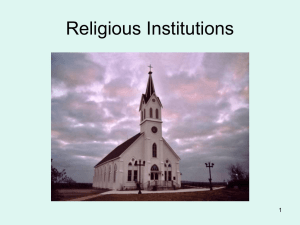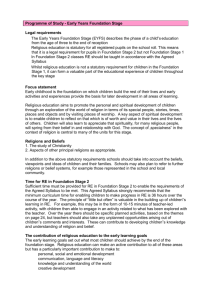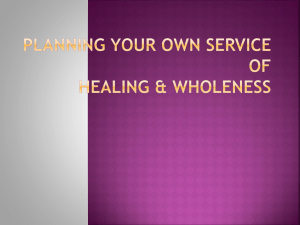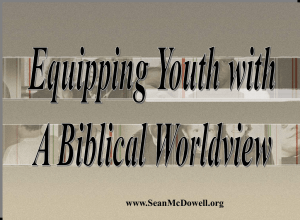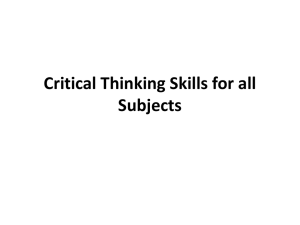Student Stellar Student Ms.Hanna English 12 Academic 11
advertisement
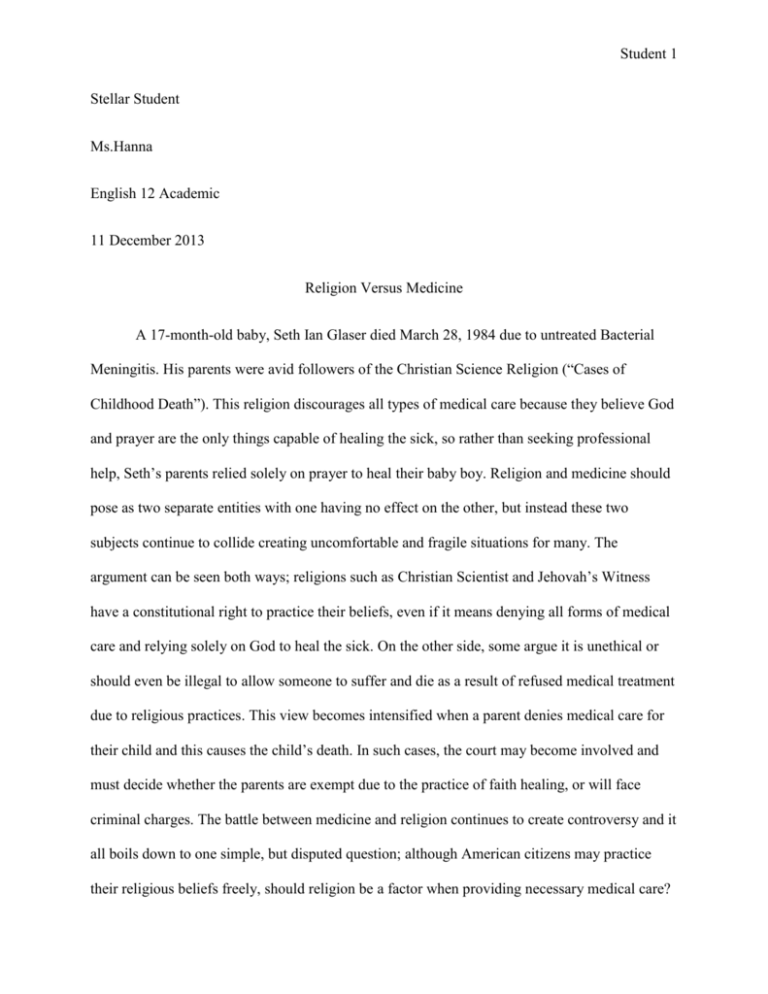
Student 1 Stellar Student Ms.Hanna English 12 Academic 11 December 2013 Religion Versus Medicine A 17-month-old baby, Seth Ian Glaser died March 28, 1984 due to untreated Bacterial Meningitis. His parents were avid followers of the Christian Science Religion (“Cases of Childhood Death”). This religion discourages all types of medical care because they believe God and prayer are the only things capable of healing the sick, so rather than seeking professional help, Seth’s parents relied solely on prayer to heal their baby boy. Religion and medicine should pose as two separate entities with one having no effect on the other, but instead these two subjects continue to collide creating uncomfortable and fragile situations for many. The argument can be seen both ways; religions such as Christian Scientist and Jehovah’s Witness have a constitutional right to practice their beliefs, even if it means denying all forms of medical care and relying solely on God to heal the sick. On the other side, some argue it is unethical or should even be illegal to allow someone to suffer and die as a result of refused medical treatment due to religious practices. This view becomes intensified when a parent denies medical care for their child and this causes the child’s death. In such cases, the court may become involved and must decide whether the parents are exempt due to the practice of faith healing, or will face criminal charges. The battle between medicine and religion continues to create controversy and it all boils down to one simple, but disputed question; although American citizens may practice their religious beliefs freely, should religion be a factor when providing necessary medical care? Student 2 The basis of the United States of America was built upon freedom. Many people were so attracted to our country because they were able to freely practice the religion of their choice without government interference. The First Amendment in the Constitution states, “Congress shall make no law respecting an establishment of religion or prohibiting free exercise thereof” (US Const. Amend. I. Sec 1). The free exercise clause prohibits the government from interfering with a person’s religious beliefs. Therefore, religions that practice even the most controversial practices should be able to freely exercise their religion, as stated by the Constitution itself. For instance, Christian scientists are one of the strictest religions when it comes to opposing almost all types of medical care; other religions such as Jehovah’s Witness only reject blood transfusions. Instead of using modern medicine to combat illness, Christian Scientist rely solely on prayer. Supporters of faith healing believe they have a right to choose to seek medical care or not, these faiths often teach that only god can heal them, and if the sick end up dying they believe it was God’s Will (“Religion and Medicine”). Although these beliefs may seem foolish and impractical to some, it is their Constitutional right as a citizen of the United States to be able to freely practice the religious beliefs of their choice. Furthermore, followers of these religions may not fully believe in all that their bible teaches, but failure to comply with the laws and beliefs of their religion could result in expulsion from the church. For instance, followers of the Jehovah’s Witness religion could be expelled from the church for receiving a simple blood transfusion (“Jehovah’s Witness”). Christian Scientists believe that matter is not real and sin, evil, sickness and death are mistaken beliefs that can be conquered by prayer; they believe sickness is an illusion because god creates perfect human beings (“Christian Science”). The Christian Science religion practices faith healing by utilizing intercessory prayer rather than modern medical treatment. “Intercessory prayer is a way for people to offer themselves as channels for God’s healing powers. While the cures that science can measure may be what Student 3 people want, God’s healing power reflects His will, which may be a form of healing that does not result in medical care” (Ryan). While many question the morality and ethics of these religious taboos, these views and practices are deeply embedded into the lives of followers of these religions, and it is their Constitutional right to practice their beliefs freely. It is often difficult to deviate from what one believes or has been taught, Christian Scientists believe that God is the only one with the power to heal and that sickness is an illusion, therefore prayer and faith healing is seen as the only way to heal the sick. Contrary to the beliefs previously discussed, many doctors, lawyers and citizens believe that denying medical care due to religious beliefs is unethical and morally incorrect especially when children’s lives are put at risk. They argue that although the Constitution states citizens should be able to practice their beliefs without intervention of the government, these beliefs should be within limits. The subject is extremely fragile when religion becomes a factor, courts have previously made legal exemptions for parents who have lost children as a result of faith healing. Recently, “…several medical and child advocacy groups have called for an end to those legal exemptions for parents who practice faith healing, saying that withholding medical care is a danger to children. According to one study, the deaths of nearly 200 children between 1975 and 1995 are linked to religion based denial of health care” (“Religion and Medicine”). The adverse effects faith healing has on its patients are often viewed as cruel and inhumane. For instance, a twelve -year old girl died from bone cancer because her parents, who are followers of Christian Science, denied her medical treatment; meanwhile the tumor on her leg grew to be forty inches in circumference. In another case, an eleven- year old boy died of untreated diabetes; he was in a diabetic coma and the practitioner or faith healer supervising him only dispersed drops of water along his forehead while he suffered from vomiting, facial spasms and uncontrollable urination Student 4 (Swan). Faith healers or practitioners are “doctors” in the Christian Science Religion, although they have no medical training and are only present to encourage prayer. They are not allowed to even give oxygen, take a temperature or even give a massage, nor do they have any expert medical knowledge (Swan). Authorities have begun cracking down on families who lose children due to faith healing rituals. For instance, a family in Philadelphia may be facing murder charges due to the death of their second child from pneumonia that could have been easily treated. Herbert and Catherine Schaible were sentenced to ten years probation, in 2009, after they denied their two-year old son medical treatment causing him to die of pneumonia. Their second child died recently from the same circumstances, consequently, the Shaible’s are being charged with involuntary manslaughter and child endangerment (Stamm). People who feel strongly about these religious beliefs not only put their loved ones in danger, but also themselves. For example, two members of the Jehovah’s Witness faith denied simple blood transfusion to combat their worsening anemia, putting their lives at risk just to follow their religious beliefs (Jehovah’s Witness). Although the Free Exercise Clause allows the practice of most religious beliefs, these practices should not include ones that endanger the lives of its religious followers. Innocent lives are lost due to medical conditions that could be easily treated by modern medicine and it is right to reprimand parents who let their children suffer and die as a result of their denying medical treatment. When it comes to saving a life, especially a child’s, religion should rarely pose as a determining factor, and medical treatment should be always given. It is both wrong and disrespectful to discourage people from the religious beliefs by which they live, therefore; adults should have the right to freely choose whether or not to accept medical care, because it is their life they endanger when they make this decision, but when it comes to the life of a child, religion should no longer pose as a determining factor in whether or Student 5 not to provide medical care. It is reasonable for an adult to decide their fate, but it is unfair for an adult to decide the fate of a child who has yet to live their life and discover their own beliefs. Also, there comes a point when saving the life of a young child should override religious laws and beliefs, and in very strict religions who do not accept medical care, exceptions should be made for young children. Although the Constitution and the law may offer exemptions due to religion and religious beliefs, this freedom is not worth the death of a child. At an attempt to compromise, instead of religion and medicine posing as two separate entities, prayer should accompany science and modern medicine by providing hope and faith for the sick and dying. Therefore, instead of these subjects posing as enemies to one another they could peacefully coexist. Student 6 Works Cited “Christian Science.” Encyclopedia. Issues and Controversies. Facts On File News Services, n.d. Web. 5 Dec. 2013. "Constitution of the United States - Official." Constitution of the United States - Official. N.p., n.d. Web. 16 Dec. 2013. “Jehovah’s Witness Patients Reject Transfusion.” Africa News Service. 26 Apr. 2012. Opposing Viewpoints In Context. Web. 9 Dec. 2013. “Cases of Childhood Deaths Due to Parental Religious Objection to Necessary Medical Care.” Massachusetts Citizens for Children. Parkin Design, n.d. Web. 15 Dec. 2013. Religion and Medicine. Issues & Controversies On File.: n.pag. Issues & Controversies. Facts On File News Services, 15 Feb. 2005. Web. 5 Dec. 2013. Ryan, Tom. “Intercessory Prayer’s Benefits Cannot Be Measured by Science.” Medicine. Ed. Louise Gerdes. Detroit: Greenhaven Press, 2008. Opposing Viewpoints. Rpt. From “Intercessory Prayer Debunked?” Catholic News Times 30 (7 May 2006):11. Opposing Viewpoints in Context. Web. 5 Dec. 2013. Stam, Dan. “Second Child Death for Convicted Faith- Healing Couple “NBC 10 Philadelphia. NBC Universal Media, 2013. Web. 5 Dec. 2013. Swan, Rita. "Parents Must Provide Necessary Medical Treatment for Children Regardless of Religious Belief." Religion in America. Ed. William Dudley. San Diego: Greenhaven Press, 2002. Opposing Viewpoints. Rpt. from "The Children We Abandon: Medical Neglect on Religious Grounds." American Atheist (Autumn 1998). Opposing Viewpoints in Context. Web. 15 Dec. 2013.

